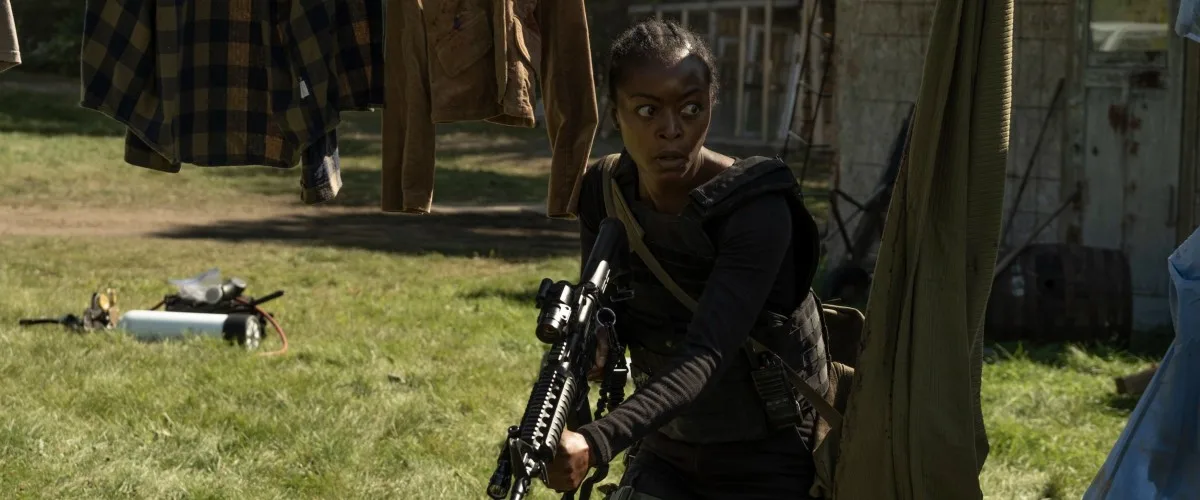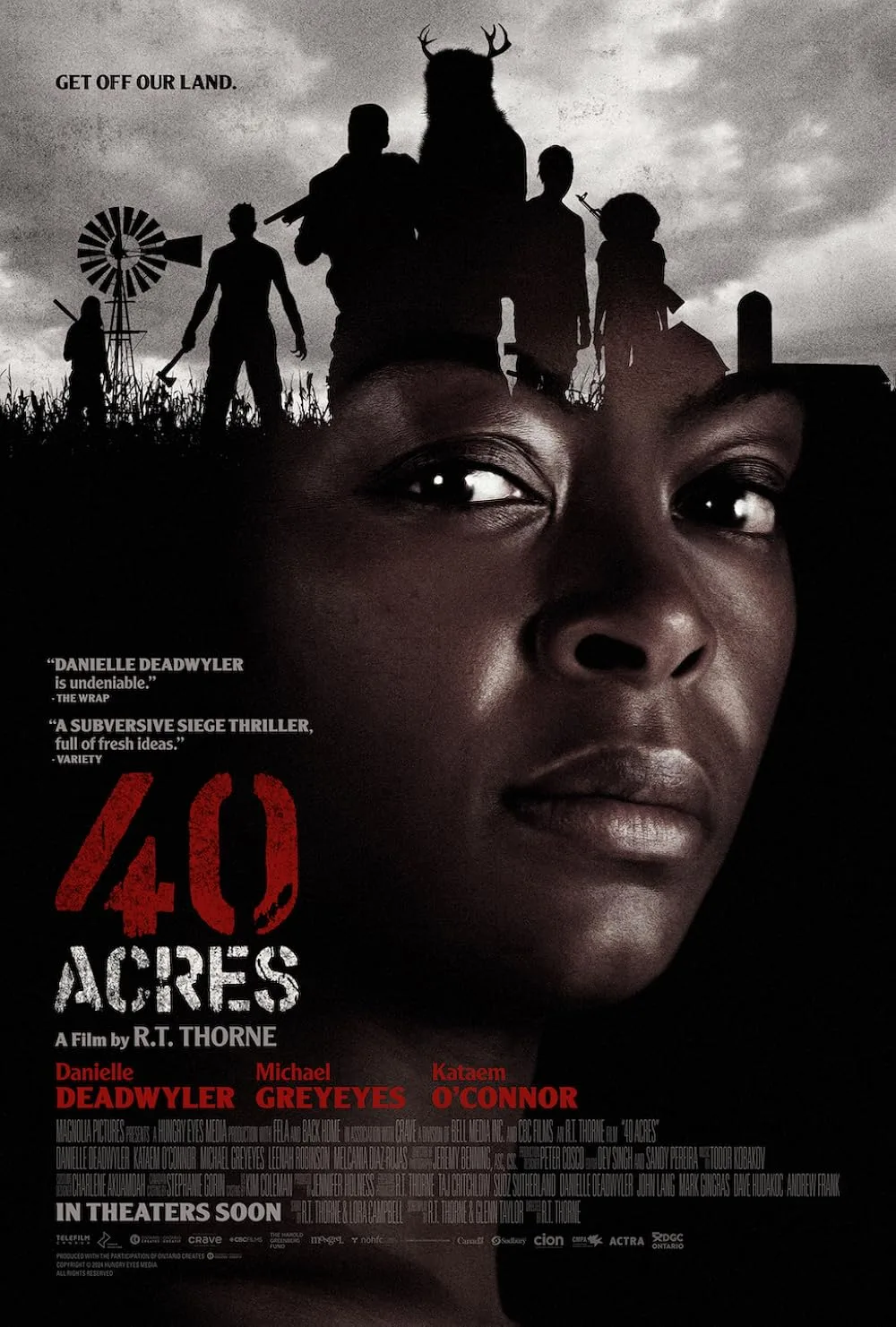“40 Acres,” like most sci-fi media of the 2020s, is an imagining of our world, our society, after the ramifications of extreme capitalism, extreme greed, and extreme environmental terror have taken hold. It’s been fourteen years since a fungal pandemic destroyed livestock and almost all animals, and twelve years since a second civil war broke out. There is no healthcare. There are no animals. There is only farmland and found family.
The film’s action-oriented opening sequence more broadly shows the importance of teamwork while simultaneously giving us a glimpse into the larger plot and brooding conflict at play. On the Freemans’ farm, which we safely assume spans 40 acres, a large farmhouse, a barn, and a garage are the only man-made structures to occupy the space. Two adults and four children (spanning from elementary to college ages) live here. They tend to the land; they defend their legacy and their lives.
The Freemans appear to be a conjoined family of Black and Indigenous Americans (not solely the land of the United States, but all of North America). What we see is justice and reparations for the original stewards of our land. Those who come together, yes, out of the desire to survive, but also the mutual cultural practices of caring for crops and sensing small seasonal shifts. This way of living, a way of intentionality and mutual respect for other life forms, seems simple in practice but is sought after by few.
The writers are well aware of the history and power of the surname Freeman. Although this decision, along with the glaring title “40 Acres,” seems almost too obvious, there is power in reiterating and connecting such histories for the audience. Co-writer and first-time feature film director R.T. Thorne presents a strong, well-crafted debut story. A strong cast and an authentic script save the moments of inconsistent pacing and unbelievable plot developments.
Danielle Deadwyler yet again elevates everyone around her. In her role as the lead and matriarch, Hailey Freeman, she is undoubtedly the most popular actor in the film. Yet, her counterparts seem well seasoned to keep up with the tenacity she brings. Her character is regimented and strict. She trusts no one; she keeps her cards close to her chest. Her coldness stems from an overwhelming amount of care that she provides, but it is often met with rebellion.
Before the film’s explicit acknowledgement of such an obvious influence, my mind draws parallels to Octavia Butler’s Parable of the Sower, and as I work through the pages of the sequel, Parable of the Talents, “40 Acres” almost seems to be an adaptation and combination of the two. Sower introduces us to the lead and narrator, Lauren Olamina, a tough and dedicated member of her community, navigating a postapocalyptic world. Talents shifts perspectives to her daughter, Asha. Similarly, “40 Acres,” while juggling multiple themes, focuses on the differences in approach between parent and offspring. And like any coming-of-age experience, there is an internal tug-of-war between wanting to remain committed to familial tradition and forging a new path of one’s own.
Hailey’s son, Manny (Kateem O’Connor), is reaching the age where 40 acres is no longer enough to entertain his desires. His breaking the rules, for only brief periods, begets bigger problems down the line. Right before total conflict takes over, there is a scene of celebration; Danis, the middle sister, has officially become a soldier. This is one of the film’s only moments of celebration; it’s one of the only forms of celebration in their fictional world. Manny has missed this celebration, having been too concerned with his own adventures. The flashback to the old farm days, when his mother first returned home from military service, shows us the seed that blooms into Manny’s desire for freedom; their family farm is all he has ever known. As he grows older, his place of safety and reprieve remains in the barn; many of the small character-development details are tied nicely in a bow this way.
In a world of crumbled systems, our modes of communication across space and time are key in keeping a sense of community and hope alive. From their well-distanced farms, the Freemans chat with the other faraway farms via radio. Systems of communication on the farm include walkie-talkies, whistling, and the native Cree language. The use of multiple methods ensures the survival not only of the Freeman family but also of these languages and technologies. “I speak in the language of my ancestors,” says Galen, the father figure, knowing that when he passes on one day, there must be others to keep it alive.
Lighting throughout the film is meant to mimic natural light, but luckily, there is still electricity in the house that powers their security system and other safety tools. At dusk and in the shadows, before darkness truly settles in, the sound design truly comes alive. The crunching and rustling of rotting crops, the switch of the safety on an intruder’s gun, the slice of a blade as it’s drawn from its sheath. Each Freeman family member is keenly aware of these sounds—signifiers that someone is there, security is suspended. A slow build of suspense steadies the pacing, allowing the audience to piece together the puzzle alongside the characters.
Before splitting ways or sending one of the kids off on a supplies trip to the depot, Hailey always says to her family, “Watch your six.” Ironically, every moment of trouble comes when they forget to watch their back. Every moment of conflict comes from something that felt avoidable. When their farm is finally attacked in the final act, it’s not due to improper planning; it’s because they split up. Despite these frustrating moments, they give the audience the classic horror film feeling of wanting to sigh loudly with disapproval and yell, “TURN AROUND!”
The believability of the storyline is also slightly suspended when trying to understand how some of the folks survive several stab wounds and gunshots, particularly when there is no sterile option for surgery or modern medicine. Nurses are heaven-sent and should be appreciated more, but there is only so much one can do with limited access to life-saving supplies. Confusion also captivated me when we witnessed and heard Rema’s popular song, Calm Down, being blasted through headphones on a Walkman; we are supposed to believe a 2023 pop song made it onto a tape before the famine fried streaming services?
Similar to this small lapse in attention to detail, the film’s resolve is almost too neat; there was no true loss for the Freemans, only more hands in the family to help repair the farm from the fight. Yet this is what makes movies and their influences memorable: They defy the impossible and showcase a certain type of hope that only exists at the end of the world.




















